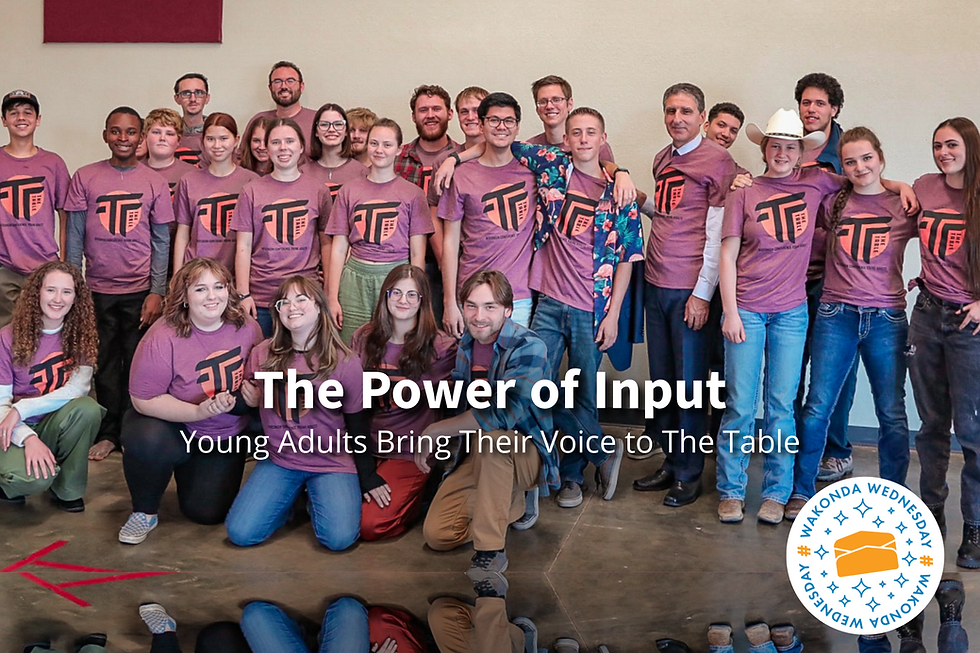Listen So They Can Lead
- PZ

- Apr 10, 2024
- 4 min read
There are lots of theories of what a leader is. Is it the great man (übermensch) who wields power and cunning? Is it the pastor or the president who seems to preside over large groups? Is it someone with extraordinary influence on the people around them? Could it be the least of these? How about the child at church?
We spend a lot of breath on phrases like "our youth are the leaders of tomorrow." And it's not wrong to say that, however I don't think it does the word "leaders" any justice. Because, the way we look at it when we utter this phrase, is that someday our young people will grow up and get an education and job and they will return back to their home church to be nominated by a committee to serve in various church board roles. And when we are too old to continue serving, they will fully take on our responsibilities in our place. Does it always work out this way though? There are a few things to look into here.
To lead is to have your voice heard and considered. Many young people leave the church too early and they don't consider coming back, because it's a place where they were never heard. "Someday" was the idea, or "tomorrow," but certainly not today: we have other people to listen to. So, our young people go off to college elsewhere, and they get the degree that opens up a job opportunity in Florida or California, and they take it. And they may attend church, but it often isn't here, and now their focus is work so if they never had the chance to lead before they left, they may not have the framework for church leadership once they're out in the world. So what happened to the "leaders of tomorrow?" They left. Maybe they'll be back, and maybe not.
That isn't to say we have to give teenagers positions like superintendent or elder just so they'll never leave--that simply wouldn't make sense. But the superintendents and elders certainly could be considering the voice of teenagers in the way they are leading out in their areas. It won't hurt--in fact, it can make all the difference.
When I was a teenager, I was asked to be on the pastoral search committee for my church. I wasn't given a title or a leadership position as a result of that, but everyone else who sat on that committee had a leadership position in the church. I was at the table with all of the (other) leaders. I was leading and I didn't know it. As a youth, I got to have input, and I was told after the fact that it was my input that led toward the church choosing the youth pastor that they did. And I loved that youth pastor: first of all because he was just a great guy for the job, but secondly because I knew he was "my" youth pastor. I chose him.
Few young people get to feel that their voice was heard. I am still in the church today, still leading. Do you think there is a correlation? Personally, I do. That doesn't mean I have delusions of grandeur about it: I'm not inherently a leader. I don't believe that God spoke through the committee to bring me on board because God had big plans in only my life, as opposed to the other young people who didn't serve on that committee. But it does mean adult leaders were willing to let a young person have a voice, and they ended up listening. What if we listened to every young person? What if we gave them all a voice?
It's thing's like this that keep people in a church. You can congregate with others inside of a church building your whole life and never feel like you're really "part of it." Adults leave churches for the same reason. I have a friend who was still patted on the head and treated like the cute token young person in the room, as he was in his mid forties. Some stick around, tuned out though they may be, because of family or friends. Others simply leave. Don't let them. Listen before they leave. Listen so they can lead.
One of the goals of Wakonda: Wisconsin Conference Youth Evangelism is to give a voice to our young people. This means letting them lead. Wakonda itself means "set apart," and we believe God has set all of our young people apart for a special purpose, to His glory. We want to help young people find what that purpose and plan is that God has for them. How can we do that if we don't first listen?
So my encouragement today is this: start listening to the young people today. And young people: speak up! Together, you can turn your church into an empowering agent for leading in your community. Because leadership works the best when we all take part. What is a leader? It's all of us. If we're given the chance to have our voice heard.




Comments